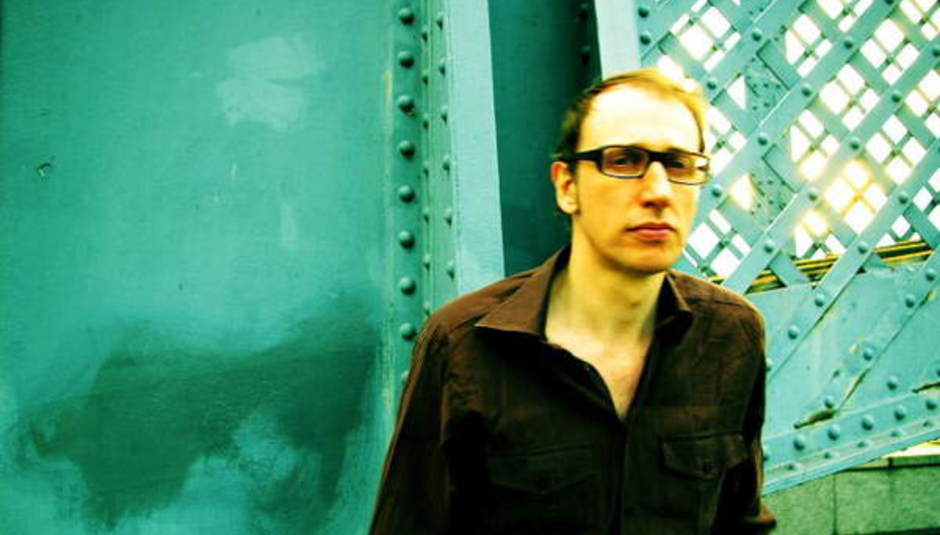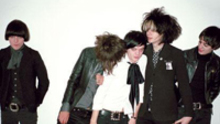It’s not often I pay any attention to the flurry of PR mailshots that filter through my inbox on a daily basis - most accentuate the virtues of humdrum bands to within an inch of a call to the Advertising Standards Agency for fraudulent claims of grandeur. Yet when the blurb for Simon Breed’s mini-album The Filth And Wonder Of... [review here] trickled into that pixilated postbox with decrees of Cave-esque atmospherics, a ripple of intrigue ensured an imminent, if sceptically-tinged, acquisition.
But the moment Breed’s prowling, stain-glassed psalms furrowed their way into these lugholes any lingering doubts were immediately quelled. A pricklesome wreath of menace and alienation, The Filth And Wonder Of... juxtaposed striking lyricism against spacious, stillborn melodies that captivated and provoked an array of emotional extremities. New record The Smitten King Laments finds Breed further progressing such expertly-crafted vicissitudes with a deluge of quietly convincing, slow-blooming cuts that should finally bring this understated tunesmith in to the pit of the public’s conscience.
So, before the release of this spell-binding long-player, DiS catches up with the frighteningly articulate and exceedingly humble Simon to discuss the album, Italian adulation and whether us music hacks have a role in the modern world…
The Smitten King Laments has been well received thus far, that must be quite relieving for you? Simon Breed: Yeah of course - it’s quite a humbling thing for someone to take the time out to listen and pay that much attention to [the record]. So far they’ve all been okay but it’s the press ones I’m most worried about. To be honest with you, I try and tell the record label [Re-Action Recordings] not to send me reviews at all because when there are ones that get it wrong - when they’ve missed it and come out with some dismissive judgement - I go into a rage. Maybe I shouldn’t be telling you that.
Probably best I know these things for future reference. You’ve been recording and playing on your own now for about a decade. Has there ever been a time you’ve thought, “Fuck it, this music lark isn’t for me”? SB: I have moments like that all the time but I don’t know whether it’s through stubbornness, or ego, or stupidity that I’ve just carried on doing it. I used to be in a band that was very much a ‘band’ band and I was able to write what I wanted and how I wanted. But what can I say? I suppose I don’t work hard enough at it; it’s just what I do.
So, do you see yourself primarily as a musician or a songwriter? SB: Neither really. I’m not good enough to call myself a musician; I’m fairly ham-fisted in all my musical abilities and songwriting is equally a real craft. In the post-punk way, I’m just somebody who makes his own little lump of plasticine into something mildly interesting. I’m not really a songwriter and I’m not really a musician but I make music and I write songs, so in the simplistic way of thinking I guess I am both of them.
But with the gaggle of pitiful male artists currently infiltrating the airwaves there’s a possibility you could be deemed yet another snivelling singer/songwriter. Do you feel like you've had to work harder to win people over because of this? SB: It’s not something I worry about. I suppose it’s kind of awkward because I fall between two stumps, in a way, as I don’t see myself as a singer/songwriter or an acoustic artist but I keep having to do those kind of gigs. If I play singer/songwriter nights people are shifting in their seats slightly because the subject matter is a little uncomfortable… I don’t mind doing them as long as they don’t mind me deliberately fucking it up for them and upsetting people in the front row. If people are there for some aesthetically bland, pleasant sort of bathing session I know I’m in the wrong place.
Well, you seem to be winning the Italians over with consummate ease [Simon has developed a cult-like following in Napoli]. What is it about you that appeals to our sun-blushed Mediterranean chums? SB: I think it’s luck and chance, but there’s also a different approach to music in both Italy and Spain. It’s less of a big deal in a way - you don’t have to be the next big shit, and people are prepared to just enjoy the idea they are in a performance. The thing that stuns me most is that they lap up any sort of poetic dexterity, they’re intrigued by wordplay and will spend hours translating lyrics they don’t necessarily get. And, well, fuck it; it’s economics. It’s absurd, but it’s cheaper for me to get an Easy-Jet and tour around Napoli because I get better fees, better wine and the audiences are more appreciative than here, so it makes sense.
You had me at the promise of better wine. Anyway, DiS recently discussed gateway artists – y’know the ones who initially got you into music but perhaps don’t pull your strings today. Any embarrassing skeletons stashed away in Simon Breed’s closet? SB: There’s no-one I’m really embarrassed by. The truth is I copy lots of stuff from people I really admire whether it’s intentional or not. When I was younger it was Sonic Youth and the Birthday Party, but there’s millions really. I think I spent six months pretending I was Julian Cope and I trailed around Nick Cave like a sad acolyte for years but he was okay about it. I’m an enormous fan of Bill Callaghan, too. I’m always disappointed when his shows end.
Apparently there’s a Facebook group that’s branded you ‘Jeff Jarvis’ in tribute to your likeness to Messer’s Buckley and Cocker. Is that irksome at all? SB: I think it’s really funny - they’re a really lovely bunch of kids. It’s their nice way of saying you’ve got a lovely voice but you’re a bit of a big geek. I suppose if you wear the big glasses you will inevitably get the Jarvis comparisons – I think Jarvis is fantastic but I’m not copying him at all – and I’ve never ever set out to copy the old Buckley warble, I’ve just always sung like that. There aren’t really that many people in that group but they just appreciate what I do and don't treat me with kid gloves and have a bit of a laugh with it. I should be so lucky to be as talented as either of them.

- - -
What lures me most to your records is the overwhelming focus on narrative and storytelling. How important are both in your songwriting process? SB: I’m far too fussy and limiting on myself that I’m only happy with a song if I feel the words and some sort of musical motif are there at the same time. It’s a cross I have to bear, but I can’t carry a song unless I think it has some kind of meaning, which probably pisses people off to some extent. The narrative thing is a habit I’ve fallen into where there is some form of linear narrative and some kind of story going on that helps me structure the stuff. I’m starting to shift away from it and am trying to see if I can create a set of sensations and specific filmic moments without having to go, ‘Once upon a time... you set it up, you get emotional, you move to the middle eight and you see what happens at the end of the story’.
For all the beautiful imagery there is also some pretty vitriolic moments lurking in your tracks. Who exactly is 'Cunts, Pricks, Wankers and Shits' aimed at? SB: It was about someone I cared about preciously who had gone through an every day humiliation in the office space. I guess it’s all about revenge. There are some kinds of unfairness’s that are inherent in society and I think you have to draw a line and say “No”. It’s supposedly offensively titled, but I found it so confusing that in this day in age – with bands called Fuck Buttons and Monkey Twat or whatever – I didn’t think that any one would care. It’s ultimately a love song in anger that says to that person, “They are unacceptable, we will not put up with anything else from them”. That’s my politics, I guess.
Has anyone walked out when you’ve played it live? SB: I think a lot of people cover their ears and flinched. It kind of depends where you play really – it’s a geographical thing. When I played it in Glasgow thousands and thousands of women were singing along heartily by the second chorus – they got it.
Somehow, that really doesn’t surprise me – those Weegies are a bit more rough and tumble than us fragile Edinburgers. So, do you perform with a live band or is it just you out on your own? SB: Well there’s been a pool of musicians I’ve played with over a number of years but it’s always been with two other people. Currently, I’m playing with Sarah Peacock on piano, who used to be in shoegazing legends Seefeel, and I’ve just started using a new drummer called Giles Narang who’s also in They Came From The Stars I Saw Them. I always want some dynamic in [the live set], but I can enjoy playing it solo, and in a way that can be just as powerful as I can let rip a bit more. But I’m really conscious of providing an audience with more than just my groaning voice, stupid words and three chords, because I know that’s not enough.
A number of tracks on the new record use vivid animal imagery to convey emotions. Is there any particular reason for this? SB: Well, I do seek solace in David Attenborough quite frequently. No, at one point the album was going to be called Animals At War, just because they kept cropping up. I just think it’s funny and I go with them, and there’s plenty more where they came from. There’s probably a technical literary term for using animals as pathos but it just seems to fit. 'Snipes' was one that just stuck with me when I was up in an extraordinarily bleak place on the Norfolk coast standing in a little bird hut where Bill Oddie types observe seabirds. It struck me that every bird had a name that was associated with depression, like a snipe or an egret, and it just seemed like the poor guys had been lumbered with it.
According to the PR blurb you’re a comic editor - that makes it quite easy for us hacks to draw parallels with your music's vivid lyrical imagery. Is this a valid assertion? SB: [Slightly exasperated] Yeah, this has ended up in the press release which is all very fascinating because reviewers have decided, “obviously his day job has gone into his work as he’s writing comic nonsense”. But in reality it’s the other way; I can’t make money from music so I have to have a job that allows me to pay for making music. It’s funny you press people like to have that little bit of extra flavour. You can’t just say “he makes music”; you have to say “in his day job he’s a clown that attacks trees”. You have to come up with all this stuff that titillates people into listening to the music. It’s one of those little tricks where having the perfect backing story is part of promotion – it’s kind of grotesque.
Um, right… [DiS immediately stops writing about the correlation between Simon’s music and his day job]. Whilst researching for our chat I attempted to uncover some previous interviews with you but couldn’t find any. Is this because you're inherently distrustful of the press? SB: It’s not because I’m some sort of recluse – it’s just no one seems interested. But I’m my own worst enemy in that respect. I should really say I’m doing the whole Nick Cave ‘I don’t like writers’ thing.
But, on the basis of this interview at least, your answers are a hell of a lot more intelligent and considered than many of the cliché–riddled bands that knock on DiS’s door. SB: Maybe that’s why [the music press] don’t talk to me? Holger Czukay [of Can fame] used to say: “Why do music journalists want to talk to rock bands? Because [the bands] are idiots.” What the media would like bands to do is reproduce the thing they want them to be; they don’t want to engage in any sort of dialogue or say anything constructive.
Sometimes I think you have a point there. So, do you think music journalists are still relevant in the modern age? SB: There’s no way you’ll die out. As long as people are interested in music and artists there will always be a need for journalists. It’s just going to be a little more fractured and the market will become more diffuse where everything is going to become smaller and smaller. I don’t think you will disappear because people will always want to discuss and debate it but it’s doubtful it will be on the kind of level of Lester Bangs. There's not going to be that kind of cultural significance; no music journalist is going to have a high position in culture again because it’s all so fragmented. Of the dozen reviews [of The Smitten King Laments] I’ve read so far there has been some lovely writing that showed an amount of application that stunned me when pulling apart the words and structure. So you won’t die out but you will find yourself on smaller web pages as everything fragments further.
Hmmm… those years at journalism school aren’t looking so big and clever after all. Finally, what do you hope to achieve in 2008? SB: I would simply love to afford to be on the road and do a lot of concerts and get to that level where I don’t have to constantly fight. I’m in the position at the moment where I’m out of breath and barely keeping my head above water just to get to the level where I can find the people who will enjoy my music. I don’t want to impose it on anyone I just simply want to find the people who will like what I’m doing. Hopefully some of the convoluted madness I’m trying to convey on this record will get through to people and mean something to them.
Simon Breed’s The Smitten King Laments is released through Re-Action Records on February 11 and will be reviewed on DiS later this week. His MySpace can be found here and you can catch him live at the following venues over the course of the next few months:
February
16 London Anti-Folk Festival @ 12-Bar Club
28 London Acoustic Suicide @ the Gladstone
March
6-15 Napoli Italian Tour – venues TBC
21 Edinburgh Voodoo Rooms
22 Glasgow Nice ‘n’ Sleazys
April
6 London The Windmill

















